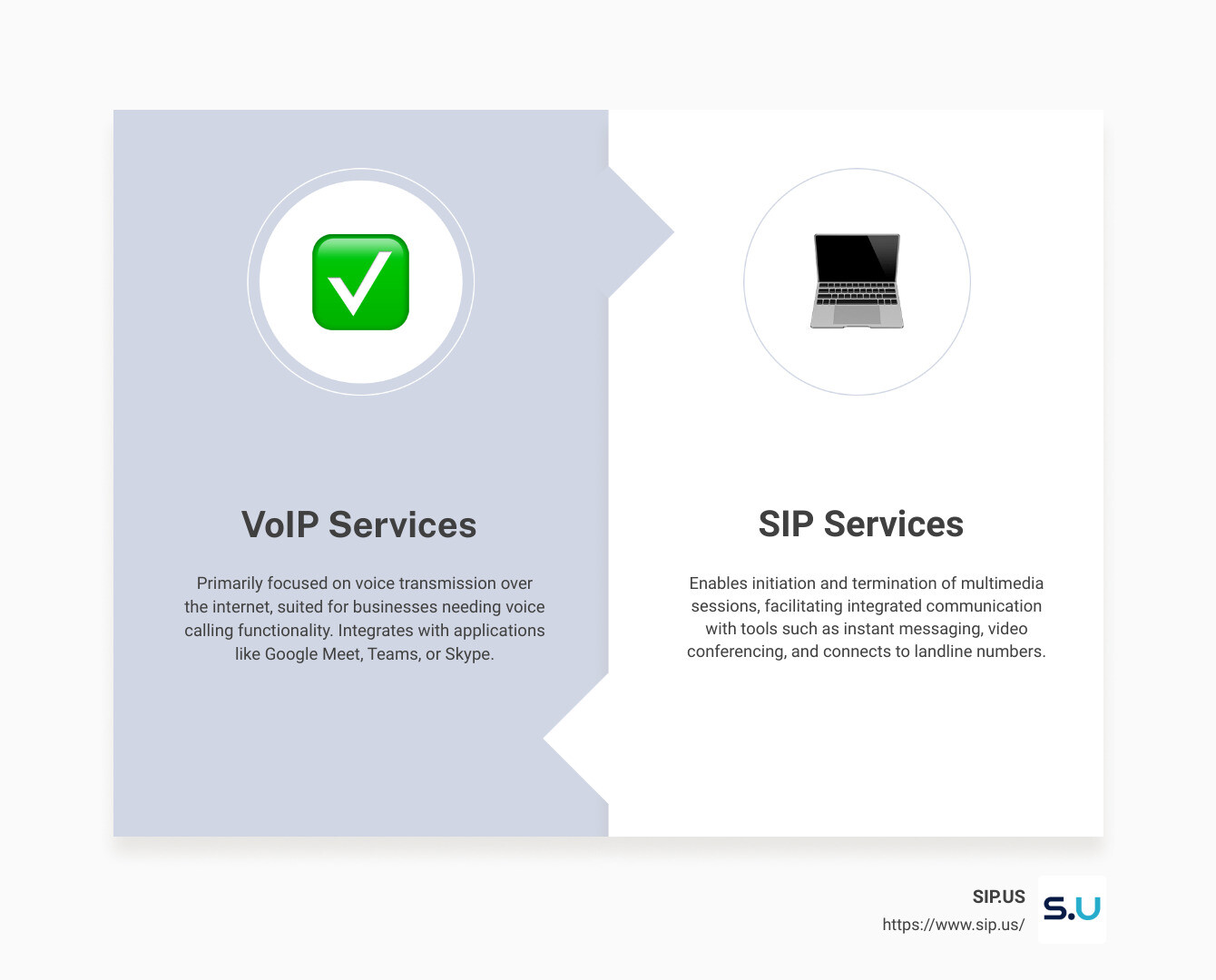
What’s the Difference Between Business VoIP and SIP Providers?
Ever find yourself struggling to keep up with your business communication needs? Wondering if there’s a more efficient and cost-effective way to ensure reliable and agile communication across your teams and with your valued customers? Then you’re not alone. Many small to mid-sized businesses are facing these very challenges. The solution and key to unlocking smooth and seamless communication lie in understanding the difference between Business VoIP and SIP.
Business communication has seen significant advances in recent years, with Voice over Internet Protocol (VoIP) and Session Initiation Protocol (SIP) taking center stage. These two technologies, although often confused, play unique roles in how businesses interact internally and externally.
VoIP is a technology that allows voice calls to be made using the internet, while SIP is a communication protocol widely used for initiating and concluding multimedia communication sessions. Understanding the roles and benefits of VoIP and SIP can be the game-changer your business needs to stay connected efficiently and cost-effectively.
An analogy to help visualize the relationship of these two concepts is to think about VoIP as the freeway that vehicles (voice data) travel on. On the other hand, SIP can be likened to the traffic rules that ensure safe and orderly transportation of its passengers (multimedia communication sessions).
Below is a quick overview of the core distinctions between Business VoIP and SIP:
- VoIP Services:
- Primarily focused on voice transmission over the internet.
- Can be used as a standalone for businesses needing only voice calling functionality.
- Easily integrated with applications like Google Meet, Teams, or Skype.
- SIP Services:
- Allows the initiation and termination of multimedia communication sessions.
- Offers communication not just between internet-connected endpoints, but even to landline numbers.
- Facilitates integrated communication tools such as instant messaging, video conferencing, and more.
For a more in-depth understanding, let’s delve into the roles of VoIP in business communication, the function of SIP in VoIP communication, and the key considerations when comparing Business VoIP and SIP providers.

The Role of VoIP in Business Communication
Voice over Internet Protocol (VoIP) has become a cornerstone technology for businesses worldwide. It’s important to understand how it works, its benefits, and how it integrates with various platforms to fully leverage its power.
How VoIP Works
VoIP is a technology that enables voice calls using an internet-enabled device over a broadband connection. It digitally converts voice signals into data packets and transmits them over the internet, unlike traditional telephony that uses physical lines for transmission. This process allows you to make calls from anywhere with an internet connection, making it a highly flexible and cost-effective solution for businesses.
Benefits of VoIP for Businesses
One of the most significant benefits of VoIP is the cost savings it offers. With no traditional phone lines to install or maintain, businesses can save on management, maintenance, and upgrade costs. Not to mention, calling costs are significantly lower with VoIP technology.
VoIP also enables Unified Communications, a suite of integrated communication tools, including audio-video conferencing, simultaneous ring, desktop sharing, and unified messaging. This integrated approach streamlines communication processes, fostering collaboration, and improving team productivity.
Moreover, VoIP solutions can easily scale with business growth. They offer the ability to add or remove lines as needed, providing a level of flexibility that traditional phone systems just can’t match.
VoIP Platforms and Their Features
VoIP platforms, such as Teams, Skype, or Google Meet, are often used in conjunction with VoIP technology. These platforms leverage the power of VoIP for voice calling and extend it with features such as video conferencing, instant messaging, and file sharing.
However, while VoIP is a powerful technology in its own right, to truly harness the potential of internet-based communication, it needs to work in tandem with another protocol – Session Initiation Protocol (SIP). In the following sections, we’ll dive deeper into the role of SIP in VoIP communication and how it enhances VoIP functionality to provide a comprehensive communication solution for businesses.
The Function of SIP in VoIP Communication
As we transition into a world of digital communication, understanding the nuances of various protocols like SIP and VoIP becomes crucial. These technologies are not just fancy acronyms but form the backbone of modern communication systems. Let’s explore the role of SIP in VoIP communication.
Understanding SIP Protocol
Session Initiation Protocol, or SIP, is a set of rules and instructions that govern the initiation, management, and termination of multimedia communication sessions. It performs a multitude of tasks, from registering users and locations, inviting users to a call, specifying formatting details, confirming receipt, initiating the session, to terminating the session effectively.
What distinguishes SIP is its flexibility and versatility. Unlike traditional communication protocols that were limited to voice calls, SIP can facilitate a wide range of multimedia communications, including voice and video calls, instant messaging, and media distribution. This makes it an integral part of any modern business communication setup.
The Importance of SIP in Multimedia Communication
While VoIP is the technology that allows voice data transmission over the internet, SIP is the protocol that enables this communication to happen. It’s the engine that powers VoIP, facilitating the transfer of messages between endpoints and setting the rules for starting and ending each session.
Without SIP, VoIP would be limited to only voice calls. But with SIP, businesses can leverage VoIP for a host of multimedia applications, including video conferencing, document sharing, instant messaging, and more. This is why SIP is often considered a game-changer in the realm of business communication, allowing organizations to enjoy a rich and diverse set of communication options.
How SIP Enhances VoIP Functionality
SIP takes the capabilities of VoIP to the next level. It allows businesses to not just make voice calls over the internet, but also to conduct virtual meetings, share documents or videos, and interact through instant messaging.
Take, for instance, the concept of SIP trunking. SIP trunking extends the capabilities of VoIP by allowing communication not just between internet-connected endpoints but to any phone number, whether landline or virtual. This means that businesses can leverage their existing internet connection to make and receive calls, thereby eliminating the need for separate voice and data networks and reducing costs.
The beauty of SIP lies in its simplicity and scalability. It requires no capital investment and little upfront costs, making it a cost-effective option for all types of businesses. Plus, it offers a high degree of scalability, allowing companies to add or remove lines quickly to match their business needs.
In conclusion, while VoIP and SIP are different technologies, they work in harmony to provide a comprehensive communication solution for businesses. By understanding the function of SIP in VoIP communication, businesses can better leverage these technologies to enhance their communication capabilities and stay competitive in today’s fast-paced digital world.
SIP Trunking: A Key Component of Business VoIP
Transitioning into a deeper understanding of business VoIP SIP technology, we need to explore SIP Trunking. This technology is a crucial component that enhances VoIP’s functions and offers businesses a plethora of advantages.
What is SIP Trunking?
SIP Trunking is a technology that leverages your existing internet connection to facilitate various forms of communication, including voice, video, and chat. SIP, or Session Initiation Protocol, allows a SIP trunk to act as a virtual phone line, replacing traditional phone lines with a more flexible and cost-effective solution.
A SIP trunk contains multiple channels, and each channel can connect a single phone call. When you make a call, your device initiates a session that occupies one channel. This channel then connects your call to the internet or your telecom carrier’s network, sending a signal to complete the call. If another person makes a call at the same time, that call uses a different channel, but both calls are transmitted over the same trunk.
The Advantages of SIP Trunking for Businesses
SIP trunking offers several significant advantages for businesses. It reduces the amount of infrastructure your business needs by allowing you to add multiple channels to a single SIP trunk, effectively giving you multiple phone lines. Without SIP trunks, you’d need to install and pay for individual lines each time you hired a new employee.
Furthermore, SIP trunking is easy to scale and can seamlessly integrate with common third-party apps and software, enhancing your business’s communication versatility. It also allows for flexible pricing, where you only pay for what you need.
Crucially, SIP trunking isn’t limited to voice communication. It also supports video calls, messaging, and even fax transmissions. This versatility allows it to serve as a Unified Communications (UC) solution, revolutionizing the way businesses approach robust communication solutions. This means all your communication tools, from video conferencing to instant messaging, can be accessed on one integrated platform, simplifying both training and maintenance.
How SIP Trunking Works with VoIP
While SIP trunking and VoIP function differently, they complement each other in a business setting. VoIP is the backbone of the communication stack, supporting voice calls over the internet. SIP trunking, on the other hand, enhances VoIP by adding multimedia functionality and enabling voice, video, messaging, and fax over the internet.
When integrated, SIP trunking and VoIP create a scalable, custom communication solution for your business. SIP protocol and SIP trunking features can be added to your VoIP system, combining the low-cost and easy implementation of VoIP with the multimedia functionality and scalability of SIP trunking.
SIP trunking transforms your VoIP system from a voice-only solution to a comprehensive communication platform that can efficiently meet all your business’s communication needs.
At SIP.US, we understand the importance of robust, flexible, and cost-effective communication solutions and are committed to providing high-quality SIP trunking services that will help your business thrive in today’s digital world.
Comparing Business VoIP and SIP Providers
Now that you understand what Business VoIP and SIP are, as well as their roles in modern communication, it’s time to look at how to select a provider. This can be a complex task, but with the right considerations in mind, it becomes much simpler.
Key Considerations When Choosing a Provider
When choosing a Business VoIP and SIP provider, it’s important not to rush. The right provider can significantly impact your business’ communication effectiveness. It’s crucial to consider a few key factors:
- Call Quality: High-quality calls are essential for effective communication. Look for a provider that maintains and improves latency, jitter, burstiness, and packet loss to ensure clear, crisp calls.
- Value for Money: SIP trunking is known for its cost-effectiveness, especially for long-distance and international calls. Look for a provider that offers pay-as-you-go pricing models versus paying upfront or for bundles. This model allows you to only pay for what you need.
- Customer Support: Finally, examine the level of customer support the provider offers. It should be readily available, responsive, and capable of solving any issues that might arise.
The Role of Network Quality in Provider Selection
The quality of the network plays a significant role when selecting your Business VoIP SIP provider. The best providers offer VoIP over a privately-owned network, avoiding the need to send communications over the public internet. This ensures more secure and reliable communication.
The Importance of Scalability and Flexibility in Provider Services
Scalability and flexibility are crucial factors when choosing your provider. As your business grows or downsizes, you should be able to adjust your plan accordingly. SIP Trunking is particularly good at this, allowing for easy adaptation to your business’s needs. This is a marked advantage over traditional phone systems, which lack this level of flexibility.
Furthermore, a flexible provider will typically offer advanced VoIP features such as Interactive Voice Response (IVR), Call Routing, and Call Forwarding. These features can give your small business the same resources as larger companies, enhancing your competitive edge.
In conclusion, selecting the right Business VoIP and SIP provider is critical for your business’s communication effectiveness. At SIP.US, we stand ready to provide you with high-quality, flexible, and cost-effective SIP trunking services. Our commitment is to help your business thrive in the digital world, offering fast setup, an easy-to-use control panel, and predictable pricing. Stay tuned to learn more about our services in the following sections.
SIP.US: A Leading Provider of Business VoIP and SIP Services
As you look for a Business VoIP SIP provider, you’d definitely want a partner that offers not just high-quality and scalable services, but also fast and easy setup, ultimate flexibility, predictable pricing, and enhanced security. That’s where we come in. At SIP.US, we take pride in providing top-notch services that meet all these needs and more.
Furthermore, SIP.US equips you with a user-friendly control panel, essentially handing you the keys to manage your business communications effectively. This dynamic dashboard allows you to add or remove lines, modify call routing, adjust services, and much more at your convenience. Simplified and efficient, our control panel offers all the necessary tools to manage your enterprise communications on your terms.
Ultimate Flexibility and Predictable Pricing
Every business is unique, and we believe your communication system should reflect that. Our SIP trunking services are highly customizable and scalable, allowing you to choose only the services you need. This means you get to enjoy a return on investment almost immediately, with no capital investment or upfront costs.
What’s more, our pricing model is predictable, so you can budget effectively without worrying about unexpected costs. This transparency is one of the reasons why we’re a preferred provider for many small and medium-sized businesses.
Secure and Reliable SIP Trunking Services
Reliability is key in communication systems. Our SIP trunking services are not only reliable but also resilient. By providing redundancy, we ensure your connection remains stable even if the internet isn’t. In the event of a failure, you can still continue your communications and collaboration.
Security is equally important. We understand the value of your data and are committed to keeping it safe. Our SIP trunking services offer robust security measures to protect your business communications.
Integration with Microsoft Teams for Enhanced Communication
Having multiple communication tools that don’t work together can be a headache. That’s why we’ve integrated our services with Microsoft Teams. This allows you to enjoy an integrated suite of communication tools, from video conferencing to instant messaging, presentation software, collaboration apps, and other business tools, all on one cohesive, cloud-based managed platform.
Our integration with Microsoft Teams takes your business communication to a whole new level. It creates a more collaborative and productive work environment, allowing your teams to stay productive and serve your customers better.
In conclusion, at SIP.US, we believe in providing you with services that not only meet your communication needs but also contribute to the growth and success of your business. You can count on us to be your trusted partner in Business VoIP SIP.
Now that you’ve explored Business VoIP and SIP, you’re well-equipped to make an informed decision about the right provider for your needs. The best provider for you will be the one that meets your unique communication requirements, offers the flexibility you need, and aligns with your budget.
As you compare providers, consider not just the cost but also the value they bring. Look for a provider that offers a robust set of features, high-quality network, and excellent customer support. The quality of a provider’s network can directly impact the quality of your calls, so choose a provider that guarantees a reliable, high-performance network.
Scalability and flexibility are two other crucial factors to consider. As your business grows, your communication needs will likely change. You’ll want a provider that can grow with you and adapt to your evolving needs. With a provider that offers scalable solutions, you can easily add or remove lines as needed, ensuring you only pay for what you use.
At SIP.US, we’re committed to providing businesses with high-quality, scalable, and flexible Business VoIP SIP solutions. Our services are designed to make your communication more efficient and effective, helping you stay connected with your team and serve your customers better.
Our fast set-up process, easy-to-use control panel, and predictable pricing make it easy for you to manage your communication services. Plus, we offer secure and reliable SIP trunking services and integration with Microsoft Teams for enhanced collaboration capabilities.
In the rapidly evolving world of business communication, we’re here to help you stay ahead. With our robust Business VoIP SIP services, you can take advantage of the latest advancements in communication technology and drive your business forward.
The right Business VoIP and SIP provider for your needs is the one that can support your business’s growth and success. We’re confident that with our services, we can be that provider for you.



